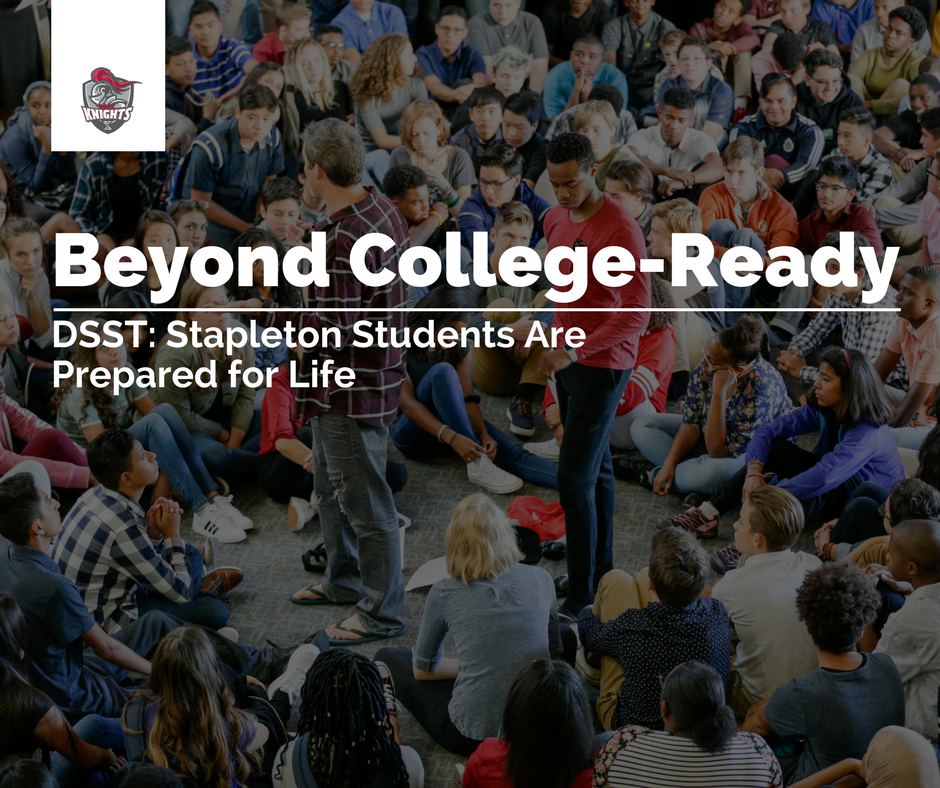Beyond College-Ready, DSST: Stapleton High School Students Are Prepared for Life
Remember life after college? Parts of it were probably thrilling, but if you were like most college grads, parts were also overwhelming—from picking an apartment, to buying food, from paying bills, to finding a job.
A pilot program at DSST: Stapleton High School is helping juniors think through the practical skills they’ll need in college and beyond. “Critical Skills” is neither college readiness nor Home Ec. Instead, it’s a series of lessons you probably wished you’d taken in high school—and it’s a lot of fun.
DSST: Stapleton Science Teacher Lara Thomas launched the pilot three years ago, and while she was initially unsure of teaching a non-science course, she embraced the challenge. No other DSST high school offers this program, so I had to dream big, “How can I design a course that will give students skills for life?”
DSST students use a trimester system, so juniors at DSST: Stapleton take ten weeks of Earth Sciences, ten weeks of Critical Skills, and ten weeks of a professional internship. Critical Skills is also divided into thirds, explains Thomas: self-exploration and public speaking, personal communication and finance, and stress management.
Who Am I? Starting with Identity
The first unit is Thomas’s favorite to teach. Every DSST: Stapleton senior undertakes a senior project, which includes a 20-minute presentation. So Life Skills serves as a scaffold by teaching juniors public speaking and PowerPoint design. Before students show off their polished speeches, they spend several weeks discussing their identity and dreams, using personality tests, art projects, and critical reflection.
“A lot of kids have been told what to do, and not all of them have had the opportunity to ask ‘Who am I? What do I want?’ for themselves,” Thomas explains.
Students also reflect on how their racial, gender, and cultural identities changes how they experience the world, helping them to consider other students’ perspectives. “The person sitting next to you is going to have completely different stories and experiences,” says Thomas, “You have your story, but that doesn’t make you better than others.”
Working with Others: Personal Finance and Communication
The second unit focuses on personal finance and communications, starting with a job interview. “Parents and teachers pretend to be employers like Apple, Marriot Hotels, or Denver Botanic Gardens. The students schedule an interview, dress up for it, and answer questions professionally. Each of the interviewers evaluates them and offers feedback to the student.”
Financial literacy is similarly hands on and practical. Students write checks, find out their credit scores, and research credit cores, says Thomas. “I also have find apartments in the city they’re going to live in after they graduate.” These real-world applications give students a taste of what’s to come.
The most popular part of the second unit unsurprisingly involves food. “We call it Critical Skills Banquet,” explains Thomas, “I went to Goodwill on a 50% off-day and purchased plates, silverware, and table cloths. Students make food over the weekend, and we transform the classroom into a little restaurant with dim lights and fake candles.” Students practice how to pass food and drink, how to place their dinnerware and napkins, and how to give a toast.
What Helps You Relax? Learning Stress Management Techniques
The final unit centers on skills that students can use right now: stress management. “Juniors don’t really have coping mechanisms,” Thomas notes, “They know when they feel it, but they don’t know what it is or how to deal with it.” Students survey a range of stress-release activities such as mindfulness exercises, breathing exercises, journaling and coloring.
“Students also present their own stress management activities,” Thomas says, “Last trimester, some of the girls decided they would make a homemade avocado face mask, so they brought that in. Even the boys were so blissed out, relaxing. Some of them will do exercise or yoga. Others have introduced origami to the rest of the class.”
Thomas appreciates the diversity of activities that students bring in, since most of them were things that she and other students had never considered as a stress management option.
From Thomas’s perspective, this kind of nontraditional course inspires confidence . One kid who had been disengaged in his other classes told his teacher that Critical Skills was “the first time I’ve actually learned things I know I’ll use after high school.”
Another value that Thomas sees is that students can express themselves “without right or wrong answers.” This allows new students to emerge as leaders. “Every student I have had appreciates this course. If nothing else, it is a place for juniors to decompress, reflect, check in with each other, and check in with themselves.”
Want to learn what else DSST: Stapleton and our other campuses can offer your student? Schedule a tour or open house today!
